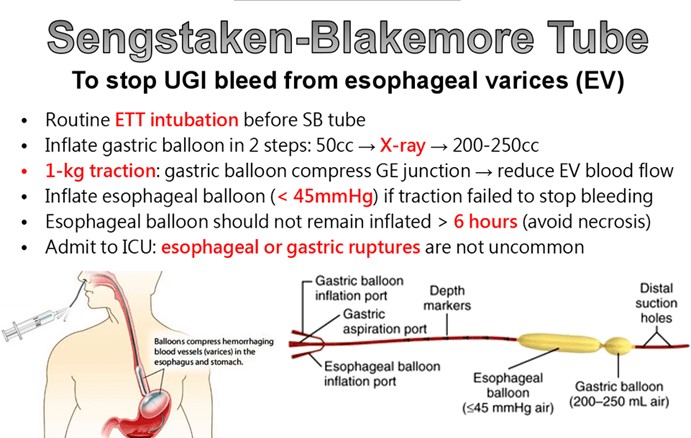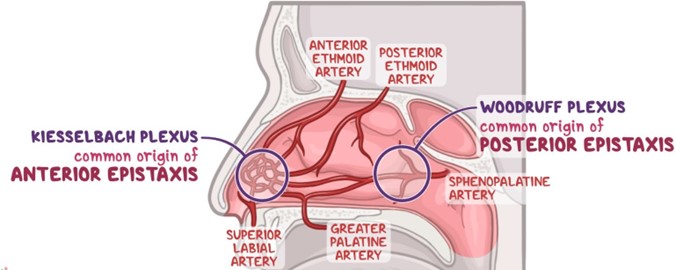A nurse is caring for a client who has bleeding esophageal varices and is being treated with a Sengstaken-Blakemore tube. Which of the following actions should the nurse perform?
Deflate the balloons for 5 min every 2 hr to prevent tissue necrosis.
Keep the head of the bed flat at all times to prevent the development of shock.
Maintain constant observation while the balloons are inflated.
Suction the tube every 2 hr and as needed to maintain patency.
The Correct Answer is C
Choice A Reason: This is incorrect. The balloons should not be deflated without a physician's order, as this can cause rebleeding or aspiration.
Choice B Reason: This is incorrect. The head of the bed should be elevated to 30 to 45 degrees to reduce pressure on the balloons and prevent gastric reflux.
Choice C Reason: This is correct. The nurse should monitor the client closely for signs of complications, such as airway obstruction, aspiration, or balloon rupture. The nurse should also keep scissors at the bedside to cut the tube and release the balloons in case of an emergency.
Choice D Reason: This is incorrect. The tube should not be suctioned, as this can damage the mucosa and cause bleeding. The nurse should only aspirate gastric contents through the gastric lumen to decompress the stomach.

Nursing Test Bank
Naxlex Comprehensive Predictor Exams
Related Questions
Correct Answer is ["A","C","E"]
Explanation
Choice A Reason: This is correct because placing ice to the bridge of the client’s nose can cause vasoconstriction and reduce blood flow to the nasal mucosa.
Choice B Reason: This is incorrect because tilting the client's head backward can cause blood to drain into the throat and increase the risk of aspiration, nausea, and vomiting.
Choice C Reason: This is correct because moving the client into high-Fowler position can lower the blood pressure in the head and neck and decrease bleeding.
Choice D reason Reason This is incorrect because instructing the client to blow his nose can dislodge any clots that have formed and worsen bleeding.
Choice E Reason: This is correct because applying pressure to the nares can compress the bleeding site and promote clotting.

Correct Answer is C
Explanation
Choice A Reason: This is incorrect because dabigatran does not affect the electrical activity of the heart or the conduction system. It does not slow down the ventricular response to the atrial impulses.
Choice B Reason: This is incorrect because dabigatran does not dissolve existing clots in the bloodstream. It only prevents new clots from forming.
Choice C Reason: This is correct because dabigatran reduces the risk of stroke in clients who have atrial fibrillation by preventing clot formation and reducing blood viscosity. Dabigatran is an anticoagulant medication that prevents the formation of blood clots in the heart and blood vessels. Atrial fibrillation is a condition where the atria beat irregularly and rapidly, which can cause blood to pool and clot in the heart chambers. These clots can travel to the brain and cause a stroke. Dabigatran reduces the risk of stroke by preventing clot formation and reducing blood viscosity.
Choice D Reason: This is incorrect because dabigatran does not restore normal sinus rhythm in clients who have atrial fibrillation. It does not affect the heart rate or rhythm.
Whether you are a student looking to ace your exams or a practicing nurse seeking to enhance your expertise , our nursing education contents will empower you with the confidence and competence to make a difference in the lives of patients and become a respected leader in the healthcare field.
Visit Naxlex, invest in your future and unlock endless possibilities with our unparalleled nursing education contents today
Report Wrong Answer on the Current Question
Do you disagree with the answer? If yes, what is your expected answer? Explain.
Kindly be descriptive with the issue you are facing.
